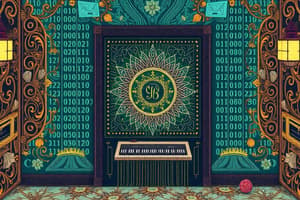Podcast
Questions and Answers
Who is known as the 'Father of the Computer'?
Who is known as the 'Father of the Computer'?
Charles Babbage
What was the purpose of John Napier's invention, 'Napier bones'?
What was the purpose of John Napier's invention, 'Napier bones'?
- A mechanical calculator
- A programming language
- A digital computer
- An abacus-like device for calculations (correct)
The first digital computer was invented by Wilhelm Schickard.
The first digital computer was invented by Wilhelm Schickard.
False (B)
What significant device did Joseph Marie Jacquard invent in 1801?
What significant device did Joseph Marie Jacquard invent in 1801?
The first successful mechanical calculator was developed by Charles Xavier Thomas de Colmar and was named __________.
The first successful mechanical calculator was developed by Charles Xavier Thomas de Colmar and was named __________.
Which of the following devices could perform all four arithmetic operations according to Gottfried Wilhelm von Leibniz?
Which of the following devices could perform all four arithmetic operations according to Gottfried Wilhelm von Leibniz?
What invention did Blaise Pascal create to assist with his father's tax collection?
What invention did Blaise Pascal create to assist with his father's tax collection?
Flashcards are hidden until you start studying
Study Notes
Evolution of Computing Technology
- Understanding the history of computers reveals the impact of technology on society and lessons from past innovations and challenges.
- Modern computing is integral to daily tasks: studying, project preparation, bill payments, entertainment, budgeting, gaming, documentation, banking, office work, online exams, and social media.
Early Computing Devices
- Charles Babbage, known as the "Father of the Computer," invented the first mechanical computer.
- The Abacus, an ancient bamboo frame device, served as an early counting tool using movable beads.
Significant Inventors and Devices
- 1614: John Napier created 'Napier Bones,' a device simplifying multiplication/division through addition/subtraction.
- 1620: Edmund Gunter developed a calculating device featuring a logarithmic scale for quicker arithmetic calculations.
- 1622: William Oughtred invented the slide rule using logarithmic scales for efficient calculations and introduced the multiplication sign (×).
- 1623: Wilhelm Schickard designed the first automatic calculator performing basic arithmetic operations.
- 1642: Blaise Pascal created the first digital computer, known as Pascaline, to aid his father in tax calculations, producing 20 machines and 50 prototypes.
Further Developments
- 1671: Gottfried Wilhelm von Leibniz developed a calculator using a stepped gear mechanism, able to perform all four arithmetic operations.
- The early calculators by Pascal and Leibniz were not widely adopted until later.
Mechanical Tools and Innovations
- Many mechanical tools existed for calculations and measurement, including planimeters and astrolabes.
- The 1770s saw the creation of 'Automata,' dolls capable of writing messages.
Innovations in Programmable Machines
- 1801: Joseph Marie Jacquard invented a mechanical loom using punched cards, paving the way for programmable technologies.
- 1821: Charles Xavier Thomas de Colmar worked on the Arithmometer, the first commercially successful mechanical calculator.
- Between 1822 and 1842, Charles Babbage designed the Difference Engine with funding from the British government.
- 1837: Babbage introduced the Analytical Engine, utilizing punched cards for inputs and capable of printing results.
Studying That Suits You
Use AI to generate personalized quizzes and flashcards to suit your learning preferences.




